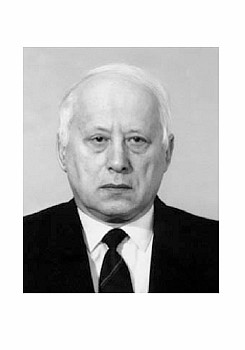|
- - - -
Mikhail Budyko
BUDYKO Mikhail Ivanovich
(20.01.1920 – 10.12.2001)
Scientist in the field of geophysics, geography, geochemistry and ecology; one of the founders of the modern theory of global warming
Mikhail Budyko was born in Gomel. In 1942 he graduated from Leningrad Polytechnic Institute. Since 1942 he worked at Voeikov Main Geophysical Observatory (director from 1954 till 1972, head of department since 1972). Since 1975 Budyko was head of a department at the State Hydrological Institute in St. Petersburg. In 1951 he received his doctorate in physics and mathematics. Budyko was an academician of the Russian Academy of Sciences (1992), an honorary member of the Geographical Society of Russia, the American Meteorological Society. His scientific works include those in the field of physical and bioclimatology, atmospheric physics, land hydrology, oceanography, physical and biogeography, actinometry. Budyko made fundamental contributions to modern science about the Earth. He developed a theory of evaporation under natural conditions, using physical, mathematical, and geographical methods to examine natural processes (1948). In 1955 he introduced a quantitative criterion to characterize geo-botanical zones (Budyko radiation index of dryness). Budyko developed methods for calculating the components of the heat balance of the earth surface (1956), which laid the foundations of modern physical climatology. He showed that changes in the heat balance of the earth surface can change the global climate, and laid the foundations for a quantitative approach to climatology (1956). An atlas of the heat balance of the Earth’s surface was published under his supervision (1956, 1963). Together with the academician A.A. Grigoriev, Budyko proposed a classification of geographical climatic zones, formulated the periodic law of geographical zonality (1962). Budyko concluded that the increase of carbon dioxide concentration will inevitably lead to catastrophic global warming (1969); he also put forward a most substantiated hypothesis of the greenhouse effect (1984). Budyko won the Lenin Prize (1958), the A. P. Vinogradov (1989) and the A.A. Grigoriev (1995) Prizes, the prizes of the Russian Academy of Sciences, the International Blue Planet Prize (1998). He was awarded the Lethke Gold Medal of the Russian Geographical Society (1972), the World Meteorological Organization Medal (1987), the Horton Medal of the American Geographical Union (1994), and other orders.
Works:
1. Глобальная экология. М.: Мысль, 1977.
2. Проблема углекислого газа. Л.: Гидрометеоиздат, 1979.
3. История атмосферы. Л.: Гидрометеоиздат, 1985 (совместно с Роновым А.Б., Яншиным А.Л.).
4. Глобальные климатические катастрофы. М.: Гидрометеоиздат, 1986 (совместно с Голицыным Г.С., Израэлем Ю.А.).
5. Антропогенные изменения климата. Л.: Гидрометеоиздат, 1987 (в соавторстве.).
6. Global Climatic Catastrophes. New York: Springer-Verlag, 1988 (with G. S. Golitsyn, and Y. A. Izrael).
Literature:
1. Dando W. A. Budyko, Mikhail Ivanovich // Encyclopedia of world climatology. Ed. John E. Oliver. Springer, 2005. P. 179–180.

© National Academy of Sciences of Belarus, 2011
|
|


